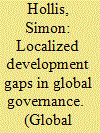| Srl | Item |
| 1 |
ID:
120836


|
|
|
|
|
| Publication |
2013.
|
| Summary/Abstract |
In recent years the European Union has taken a number of steps towards improving civil protection cooperation in Europe. European leaders regularly declare the importance of boosting cooperation to prepare for and respond to disasters and emergencies afflicting member states. Those declarations have been accompanied by a flourish of policy activity, the building of new structures, and even treaty changes. On the surface, this little-known area of European integration appears to be proceeding with great success. A closer look, however, reveals significant gaps between member states' general expressions of enthusiasm and problematic cooperation in practice. We draw upon public goods theory to explain why this might be the case; more specifically, we identify likely game-theoretic obstacles to cooperation in different areas of the civil protection field. We evaluate our theoretical propositions by examining the current state of cooperation in marine pollution response, chemical contamination management, and flood response. We find that cooperation success in practice corresponds generally, but not perfectly, with the predictions of public goods theory. Our findings offer a nuanced view of civil protection cooperation in Europe and illuminate options for improved cooperation in the future.
|
|
|
|
|
|
|
|
|
|
|
|
|
|
|
|
| 2 |
ID:
132054


|
|
|
|
|
| Publication |
2014.
|
| Summary/Abstract |
Natural disasters have become a heightened security issue in the last decade. Mitigating and responding to disasters, such as the 2004 tsunami in Southeast Asia and the 2011 earthquake in Japan, reflect a new security agenda that has spread across the globe and infiltrated most regional organizations. At first glance, the creation of regional programmes on disaster risk management (DRM) appears to be driven by the functional preferences of states. However, a comparison of ten regional organizations reveals some curious ambiguities. Despite different threat perceptions, financial budgets and geographical environments of regional organizations, a majority of states have formed DRM programmes that exhibit highly standardized features in terms of language, the referent points of protection and the apparent motivations for cooperation. World society theory is used to explain these striking similarities with reference to the global cultural system. This article also illustrates the analytical purchase of world society theory in understanding cooperation through regional organizations.
|
|
|
|
|
|
|
|
|
|
|
|
|
|
|
|
| 3 |
ID:
151679


|
|
|
|
|
| Summary/Abstract |
Global framework agreements on disaster risk reduction aim to reduce the vulnerability of states from the effects of natural hazards and guide international development strategies. The effects of these agreements have surely saved lives and buffered shocks to economic systems. Yet there remains a gap between global aims and envisioned outcomes in local communities. This article argues that cultural determinants of risk, which shape the reception and translation of ideas on DRR, must be taken seriously if international organizations wish to enhance their efficacy and reduce vulnerability. Elucidating the importance that indigenous practices of resilience, time, and governance have for the global diffusion of DRR can help to reduce this gap and encourage more effective development policy in the future.
|
|
|
|
|
|
|
|
|
|
|
|
|
|
|
|
| 4 |
ID:
099793


|
|
|
|
|
| Publication |
2010.
|
| Summary/Abstract |
The remarkable increase in European security and defence integration in the past decade has presented a challenge to traditional integration theories. Although they remain relevant, these theories fail to take full account of the changing security architecture of Europe, which includes the rise of transgovernmental networks (TGNs). With a focus on EU civil protection, this article critically examines established definitions of TGNs and investigates how these networks influence the supranational and national levels of security cooperation. Findings point toward the emergence of an alternative form of European security governance that addresses the lack of authority in EU security policy.
|
|
|
|
|
|
|
|
|
|
|
|
|
|
|
|